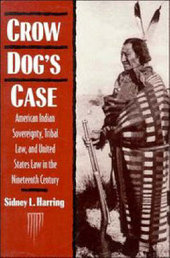
|
Crow Dog's Case: American Indian Sovereignty, Tribal Law, and United States Law in the Nineteenth Century
Paperback / softback
Main Details
| Title |
Crow Dog's Case: American Indian Sovereignty, Tribal Law, and United States Law in the Nineteenth Century
|
| Authors and Contributors |
By (author) Sidney L. Harring
|
| Series | Studies in North American Indian History |
|---|
| Physical Properties |
| Format:Paperback / softback | | Pages:320 | | Dimensions(mm): Height 232,Width 151 |
|
| Category/Genre | World history - c 1750 to c 1900 |
|---|
| ISBN/Barcode |
9780521467155
|
| Classifications | Dewey:347.3008997 |
|---|
| Audience | | Professional & Vocational | |
|---|
| Illustrations |
12 Halftones, unspecified
|
|
Publishing Details |
| Publisher |
Cambridge University Press
|
| Imprint |
Cambridge University Press
|
| Publication Date |
25 February 1994 |
| Publication Country |
United Kingdom
|
Description
Crow Dog's Case is the first social history of American Indians' role in the making of American law. The book sheds new light on Native American struggles for sovereignty and justice in nineteenth century America. This "century of dishonor," a time when American Indians' lands were lost and their tribes reduced to reservations, provoked a wide variety of tribal responses. Some of the more successful responses were in the area of law, forcing the newly independent American legal order to create a unique place for Indian tribes in American law.
Reviews"Regardless of differences in historical interpretation, few will doubt Harring's conclusions. He has shed insights into nineteenth century tribal legal processes, and that alone is a worthy contribution to legal scholarship of nineteenth century Native American history and he accomplished that task by writing an informative, questioning story." Richmond L. Clow, Great Plains Research "...a trenchant reminder of the absolutely central role that history--for better or worse--plays in the enterprise of Indian Law." Frank Pommersheim, Journal of American History "...provides a valuable foundation for understanding the complexities of the legal relationship between the federal government and Indian tribes...Harring's work shows what a rich field of study this can be." Raymond J. DeMallie, Indiana Magazine of History
|